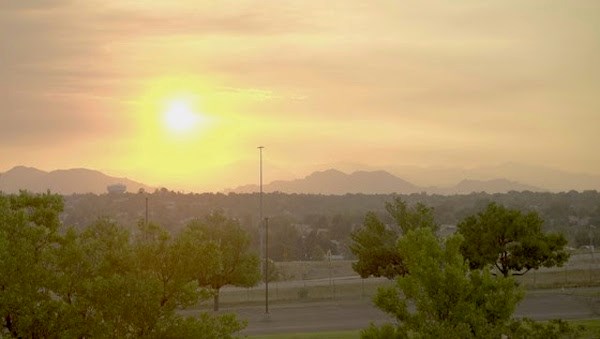The combination of hot temperatures, wildfire smoke, and air pollution created high levels of ground-level ozone in Boulder County this week.
Air quality monitoring stations in Longmont and at Boulder Reservoir recorded dangerous spikes in ground-level ozone on Tuesday, with the highest measurements, taken from 5-minute averages, reporting 102 parts per billion shortly after 1 p.m. in Boulder and over 115 parts per billion around the same time in Longmont, Boulder County Public Health announced in a Wednesday news release. The federal health standard is 70 parts per billion, according to the release.
The highest eight-hour ozone average concentration on Tuesday was 79 parts per billion at the monitoring site in Boulder, according to the release.
"Ozone has often been in the 'unhealthy for sensitive groups' to generally 'unhealthy' categories this summer, with over 40 ozone action days issued for the Front Range," the health department stated in the release.
In response to the ozone spikes, local governments in Boulder County have engaged researcher Detlev Helmig to monitor multiple pollutants at five sites, according to the release. The monitoring data can be viewed in real-time at BoulderAir.com.
Helmig is the scientist with whom Longmont City Council renewed an air monitoring contract at its Tuesday meeting.
“These high ozone levels are due to a number of human influences on the environment that have converged in the last few weeks,” Collin Tomb, air quality team lead at Boulder County Public Health, stated in the release. “A mixture of air pollution from the use of fossil fuels during activities such as driving, heating and cooling, electricity generation and manufacturing — in addition to emissions from oil and gas production — contribute to the high ozone levels we’re seeing now.”
While driving declined in the early days of the coronavirus pandemic, traffic is returning to normal levels, and oil and gas production is nearly as active as at this time in 2019, according to the release.
Smoke from wildfires burning across the state also contributes to ozone and increases particulate matter in the air.
"The combination of fine particulates in smoke with lung-burning ozone can be harmful to everyone, but it is particularly damaging for seniors, children, and those with heart and lung conditions — many of the same people who are at added risk from COVID-19," the release stated.
"The bottom line is that these are dangerously high levels of ozone,” Cindy Copeland, air quality specialist at Boulder County Public Health, stated. “These high levels are continuing and they are only partially due to smoke. Because of climate change, wildfires are becoming more part and parcel of daily life in Colorado during the summer and shouldn’t be discounted as exceptional events. Emissions from the sources that we can control need to be reduced even further so we don’t continue to have such unhealthy conditions during the summer months when people both need to work outside and want to enjoy the outdoors.”
The county health department advises people to monitor air quality conditions in their area and avoid prolonged exertion outdoors when air quality is poor. Air quality conditions can be monitored at AirNow.gov.
It also urged individuals to take action to reduce ozone emissions by reducing driving, combining car trips, switching to electric lawn equipment, and filling up on gasoline after 5 p.m. More tips are available at simplestepsbetterair.org.
For more information about air quality and public health, visit boco.org/


.jpg;w=120;h=80;mode=crop)
